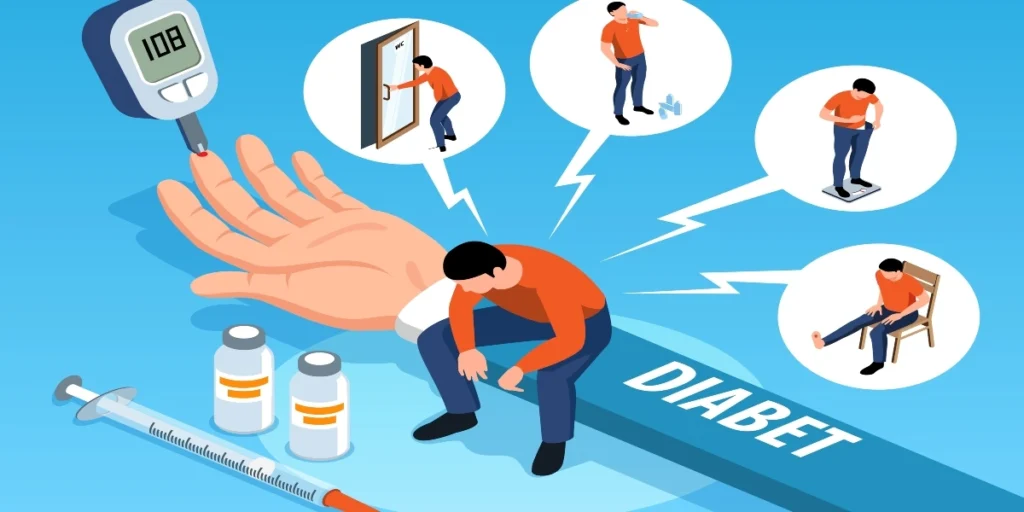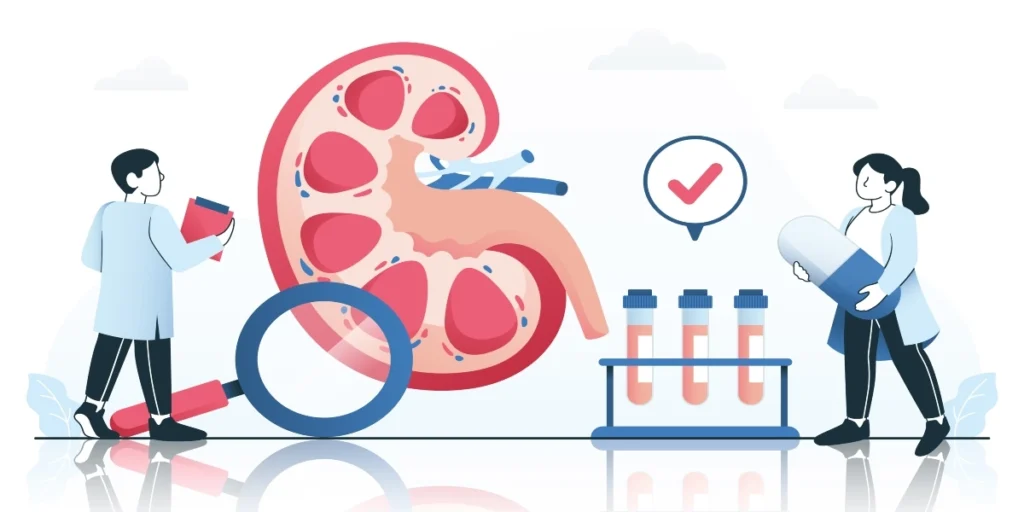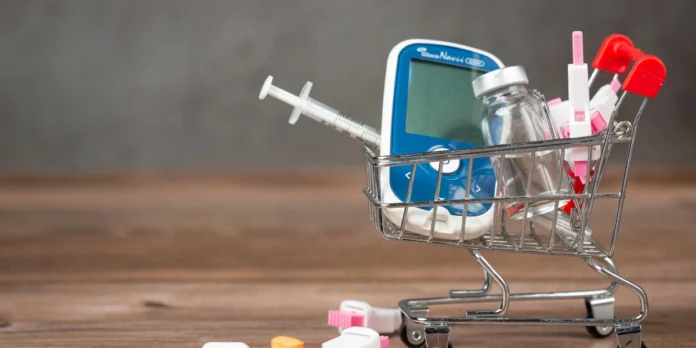Diabetes is a condition in which your body does not produce insulin or use it properly. It can affect many body parts including the heart, kidneys, eyes, and brain. The organ it affects the most is the kidneys, and over time, this can lead to kidney disease and kidney failure. Diabetes is the main cause of kidney failure. Chronic kidney disease (CKD) often develops slowly and with few symptoms that’s why it leads to dialysis or kidney transplant as most people do not realise they have CKD. CKD is common in people with DM. Studies have shown that 1 in 3 adults with DM has CKD. Kidney failure is caused by both type 1 and type 2 diabetes. In this blog, we will discuss how diabetes causes kidney failure, its symptoms and prevention.
Table of Contents
Diabetes and its types:

Type 1 diabetes:
This type of diabetes is also known as insulin-dependent DM. It is a chronic disease in which the pancreas(breaks down sugar and fats) makes no insulin. Insulin is one of the most important hormones and helps in storing and transporting glucose to produce energy.
Causes:
It is transferred through genes or sometimes through viruses. Mostly it is developed in childhood but in some conditions, it can develop in adults too.
Cure:
Unfortunately, there is no cure for type 1 diabetes. The only known cure to date is the transplant of the pancreas.
Type 2 diabetes:
It is a condition in which it stops your body from using insulin properly which leads to high blood pressure. It can cause an increase in the ratio of sugar in the blood. It can cause many disorders in nerves and blood vessels.
In type 2 diabetes, there are primarily two problems. The pancreas does not produce enough insulin — a hormone that regulates the movement of sugar into the cells. Cells respond poorly to insulin and take in less sugar.
It usually occurs in adults but can also begin in adults.
Causes:
The most common cause of type 2 diabetes is overweight and not being physically active.
Cure:
Unfortunately, there is no proper cure for type 2 as well. You need to maintain a healthy weight, exercise daily and take a balanced diet to control it.
How Diabetes Causes Kidney Failure

Diabetes can harm the kidneys by causing damage to:
Damages Blood vessels:
Our kidneys are made up of nephrons which are the filtering units. Nephrons consist of glomerulus and tubule which help in filtering your body and remove waste from the blood. Over time, high blood sugar from DM can damage blood vessels in kidneys and make them narrow and clogged which makes it difficult for them to work properly.
Damages the Nerves in your body:
Diabetes may also result in harm to your body’s nerves. From your brain to every other area of your body, including your bladder, nerves transmit messages. When your bladder is full, it alerts your brain to it. However, you might not be able to sense when your bladder is full if damage has been done to the bladder’s nerves. Your kidneys get harmed by the pressure of a full bladder.
Damages the Urinary tract:

Long-term retention of urine in the bladder increases the risk of urinary tract infection. The cause of this is bacteria. Similar to germs, bacteria are microscopic organisms that can cause illness. When urine has a high level of sugar, it proliferates quickly. Although they usually attack the bladder, but sometimes move to the kidneys as well.
This is how DM can cause kidney failure by damaging the veins and blood vessels of your kidneys. If you or any member of your family have DM, get your regular checkups. It is the best method and It is detected through blood and urine tests and you can get to know whether your kidneys are damaged or not.
Symptoms
Diabetic kidney failure is not directly caused by DM itself. Rather, DM raises the possibility of diabetic nephropathy, a disorder that eventually raises the chance of kidney failure. In its early stages, diabetic nephropathy does not show any visible symptoms. But when kidney disease worsens, people may start to feel signs of decreased renal function.
- Proteinuria: one of the earliest signs is the increase in the ratio of protein, especially albumin, in urine. This condition is called proteinuria. You can know the ratio by getting a urine test from the laboratory.
- Swelling (Edema): another sign is the swelling of body parts. The body retains fluid, which makes it difficult for the kidneys to eliminate extra fluid from the body. This results in swelling in the legs, ankles, feet, and occasionally the face.
- High Blood Pressure: If DM is causing kidney damage or failure you will witness an increase in your blood pressure and it becomes very difficult to control.
- Weakness and tiredness: You will feel exhausted and tired all the time as the function of kidneys is to remove the toxins from the body which get affected due to DM. When the kidneys are not working properly they are unable to remove waste from the body and it may build up in the body, causing fatigue, tiredness, and weakness.
- Changes in Urination: Another important sign is the change in the amount, frequency or colour of urine and it becomes foamy.
- Lack of Focus: It also affects cognitive function and concentration.
- Shortness of breath:
- Loss of appetite.
- Nausea and vomiting.
- Itching.
Risk factors of Kidney Failure due to Diabetes:
If you have diabetes, the following can raise your risk of kidney failure:
- Hyperglycemia: A condition in which your blood sugar level becomes uncontrollable.
- Hypertension: This is the condition in which your blood pressure increases.
- Smoking is another factor that promotes it.
- High blood cholesterol.
- Obesity.
- A family history of DM and kidney disease.
Tips to avoid Kidney Failure caused by Diabetes:

- Keep your blood sugar levels under control. If you have high blood pressure try to manage it by taking a healthy diet, and being physically active. Make sure to keep it below 140/90 mm/Hg.
- See your doctor twice a year to manage DM. Keep appointments to check on how well you are managing your diabetes and to check if it is affecting any other body part or not.
- Treat your DM. With good treatment of DM, you can keep your blood sugar levels in the target range as much as possible.
- Try to maintain a healthy weight. If you’re at a healthy weight, try to maintain it by being physically active. Join the gym or try to walk daily for at least half an hour so that you can stay persistent and healthy. Search for the ways by which you can maintain your weight. Try taking meals in portions and manage to take all the nutrients to avoid kidney failure by DM.
- Don’t smoke. If you are already suffering from DM, the chances are your kidneys are already at risk. So, do not harm them more by smoking. Proper counselling and support from family can make you stop smoking.
- Maintain your cholesterol level.
- Eat more fruits and vegetables.
- Be physically active.
- Take your medicines as directed.
Conclusion:
Diabetes is a serious health issue, and it should be treated properly. It can cause damage to other organs including kidneys. DM can cause kidney failure and it is possible in both type 1 and type 2 diabetes. Be very careful about it as it has no proper cure, and it does not show any early symptoms. So get your regular checkup done, try to maintain a proper diet, be physically active, and maintain weight to prevent kidney failure.
FAQ’s
How does diabetes cause kidney failure?
Diabetes can destroy the blood vessels and nerves of your kidney, it clogs the blood vessels which causes kidney failure.
What are the causes of type 2 diabetes?
Being overweight and not doing physical activities can cause type 2 diabetes. It is commonly found in adults.
How can I control my diabetes?
Follow a diet plan, be consistent with your exercise, take your insulin properly, maintain your weight, and visit your doctor when needed.

